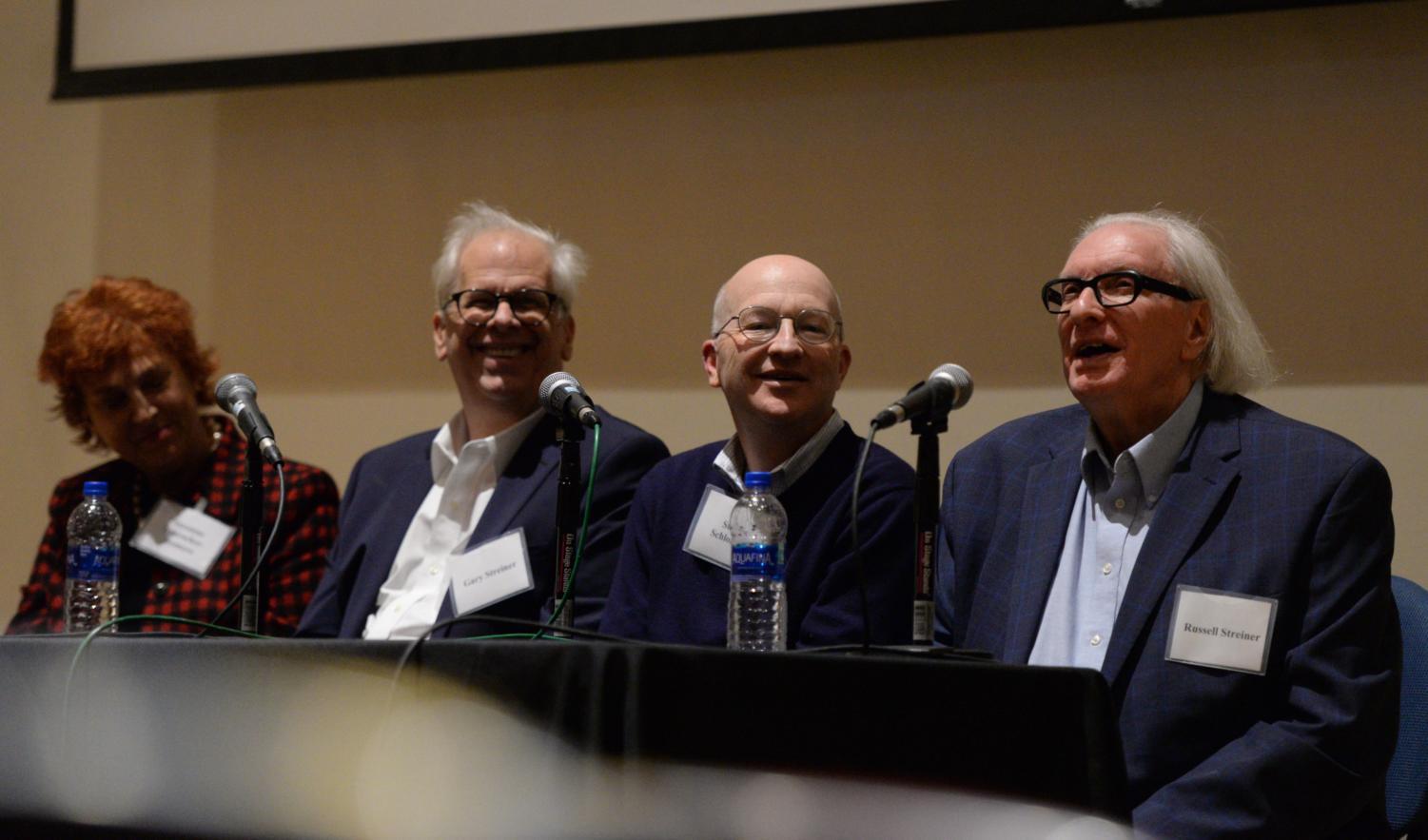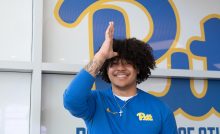Remembering horror film icon Romero at Carnegie Lecture Hall


Panelists Suzanne Desrocher-Romero, Gary Streiner, Steven Schlozman and Russell Streiner speak at the “Reflections on Romero” event on Friday. They shared memories of the legendary filmmaker George A. Romero — who is known for directing “Night of the Living Dead.”
As a slideshow of zombies, gory death scenes and a young George A. Romero gathering with family and fellow creators flashed across the screen, horror lovers filled the aisles of Carnegie Lecture Hall to honor the life and legacy of the director known for the cult classic film “Night of the Living Dead,” which was filmed near Pittsburgh and released in 1968.
The event, “Reflections on Romero,” was presented by the University of Pittsburgh’s Humanities Center and the Carnegie Museum of Art. The intimate group of attendees sat in the first eight rows of the lecture hall and focused on remembering the CMU alum and film legend.
“Night of the Living Dead” represented a significant shift in the horror genre when it was released, with reviewers such as Pauline Kael — a critic then with The New Yorker Magazine — saying it was “one of the most gruesomely terrifying movies ever made.” The zombies seen in popular shows and movies today, such as in AMC’s “The Walking Dead,” can largely be traced back to Romero.
Kate Burke, a local Pittsburgh resident and attendee at the event, said “Night of The Living Dead” was one of the only horror movies she enjoyed.
“What struck me the most about Romero’s movies were the endings,” Burke said. “He’s been such a major influence in cinema. He was a real innovator.”
And Romero had to be.
“It was the dark ages back then,” Gary Streiner, a producer and sound director for many Romero films, said. “There was really no one to learn from yet and all you could do was read cinematography manuals and try and figure out the equipment the best way you could.”
Streiner said when he began working with Romero in his senior year of high school, he would attend classes for half of the day and work on movie production for the second half.
Together they founded “Latent Image,” a production company that created commercials and industrial films. The company gave them some of their first hands-on experience with film and real studio work.
Romero had endless jokes, characters and games to share with his team, Streiner said. He taught them a game called floor war, where the players would set up plastic soldiers on the floor and attempt to knock each one over with a handful of marbles. The team played games for hours, never letting their work cause them to lose sight of the importance of fun.
“One of the key factors to our success was always laughter,” Streiner said.
Russell Streiner, Gary’s brother and an actor in many of Romero’s films, said that their success did not come easy to them.
“We had to do something to keep groceries on the table, so we decided to do something with film,” he said about Latent Image.
Despite a low budget and relative inexperience, “Night of The Living Dead” grossed $30 million internationally in the decade after its release.
Romero passed away in 2017 from lung cancer. In his wake, Gary Streiner, along with Pitt professor Adam Lowenstein and Romero’s wife Suzanne Desrocher-Romero, helped set up Romero Lives, a coalition of more than 30 Pittsburgh organizations dedicated to honoring the life and legacy of the director.
After a montage of Romero’s life and work, a panel discussion called “Early & Late Romero” began. The panel featured Desrocher-Romero, the Streiner brothers and Steven Schlozman, a psychology professor at Harvard and author of the book “The Zombie Autopsies.”
While Schlozman — or “Schloz,” as Romero used to call him — spent less time with Romero than the other panelists, he had no shortage of good things to say about the man.
“He had this uncanny ability to make everybody feel like they’d known him for life,” he said.
Desrocher-Romero, one of three wives Romero had over the years, was married to Romero since 2011 and also had a lot to say about her husband’s infectious personality and charm. She met him in 2005, years before she had ever even seen his movies. After they had been dating for a while, Romero insisted they have a “Romero Film Festival” — just the two of them. He thought it was time she finally saw some of his work.
“He invited me to see a rough cut of ‘Night of The Living Dead.’ I saw the film and my critique was, ‘It wasnt that bad,’” Desrocher-Romero said.
Desrocher-Romero disliked the horror genre for many years, but her husband’s work eventually changed that.
Following the first panel, a viewing of exclusive “Dawn of the Dead” footage was shown. There was no sound or dialogue and the film showed hundreds of Pittsburghers colliding with each other, wandering the streets with wide zombie eyes and lazy bodies.
The audience got a kick out of the acting in the footage. The first few rows were roaring with laughter as a shirtless zombie with a large belly ran into a storefront window with a deadpan face.
The panelists also spent time discussing some of Romero’s other noteworthy films, including “Night Riders” and “Martin.”
“Those three films were the most complete visualizations of his mind and what he wanted to see on screen,” Christine Forrest, Romero’s second wife and longtime life and work partner, said.
Romero’s love of art, film and laughter stuck with the speakers over the years. Their time spent with Romero wasn’t just a marker of youth, but a growth experience that informed deeper aspects of their careers and artistic relationships later on in life.
“While working with Romero, I got to live the American dream. It didn’t necessarily involve yachts, but it’s the exciting reason I’m able to be here and speak to all of you,” Gary Streiner said.
Recent Posts
SGB addresses concerns about ICE presence on campus, hears SJP lawsuit against administration, approves governing code bill
At its weekly meeting on Tuesday at Nordy’s Place, Student Government Board heard concerns about…
ACLU of Pennsylvania sues Pitt over SJP suspension
The ACLU of Pennsylvania filed a federal civil lawsuit against the University of Pittsburgh and…
Marquan Pope: The ultimate shark
One of the most remarkable things about sharks is that an injury doesn’t deter them.…
Who Asked? // Do we really get a summer vacation?
This installment of Who Asked? by staff writer Brynn Murawski mourns the seemingly impossible perfect…
Notes From an Average Girl // Notes from my junior year
In this edition of Notes From an Average Girl, senior staff writer Madeline Milchman reflects…
Meaning at the Movies // The Power of the Movie Theater
In this edition of “Meaning at the Movies,” staff writer Lauren Deaton discusses her love…

